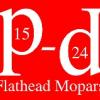Do Some Book Learnin And Make Your Project A Little Easier...
We actually have it pretty easy when it comes to getting our projects back on the road. Even though we are working on 60 year old technology original factory documentation is readily available. Original and reproduction shop manuals, parts books, factory technical training material are available from many parts suppliers. Think about how difficult it would be if you didn't have any reference information and everything was passed by word of mouth (or the internet)!
So what should you have in your garage library? First two purchases should be a factory service manual and factory parts book for your vehicle. The factory service manual typically has wear limit specifications so you can determine when service is needed, general maintenance and tune-up specs and the the proper process for different repairs. A careful reading of the service manual before you start a repair is recommended as many times tips are provided to make the job easier or expose some less than obvious service procedure. The proper replacement of valve guides (they don't all go in the same way) or the correct process for lubing rear axle bearings comes to mind. It should be at your side when you are working on a repair.
The gold mine for me is the factory parts manual. It answers many, many questions about what is the right part, what will interchange (mopar factory part number), how does this go back together (exploded diagrams) and what options were available. When I took ownership of my first P15 their was a steel bracket in the trunk. It was about 5" long, couple holes drilled in it with some angle cuts. No idea where it came from or it's purpose. Years later when I finally discovered a factory parts manual I figured it out. It was the bracket that held the spring so the clutch rod would fully return. (bracket 6-27-6 in the illustration) It held the spring that kept the rod (6-24-1) from falling out of the lever to activate the clutch! Because the lever had fallen out many times I had ended up taking a throttle spring and wrapping it around the clutch shaft to hold the spring in place. Many of us are the victims of the actions of previous owners and the results ending up in the trunk. A parts book is like having a native guide to find the path back to way the factory originally put it together. The parts book also lists factory mopar part number. This is critical for finding parts with many vendors that stock their inventory by factory part number, not application. With a factory parts number you can use a site like PartVoice.com to search many suppliers at once for a part.
Another really helpful book is a Hollanders Interchange manual. They cover different years (I use a '40 to '56 version) and are a wealth of information you won't find anywhere else. Originally targeted for garages and junkyards they basically list what parts will interchange with other cars. Will a club coupe rear window fit a sedan? What ignitions can I swap? What are the bearing numbers I need for the front wheels? I would also add an owners manual to the list of must haves. It provides basic operation instructions, maintenance and care information for a driver unfamiliar with '40s-'50s technology.
To finish out the library I would add sales literature for my vehicle, paint chips and some third party reference info. For example, Bunns B Series book is a fantastic resource for truck owners loaded with factory pictures. For more wrench turning support a Chiltons or Motors manual provides practical "how to" information. Stockel's Auto Service and Repair is also a great reference guide.
To help you get started building out your garage library three of our site sponsors, Andy Bernbaum Auto Parts, MoParMall.com and Vintage Power Wagons have extensive in-stock inventory of factory manuals, part books, owners manuals and associated literature. Check them out now!
Now it's your turn. What have you added to this list as a must have book for your shop?




8 Comments
Recommended Comments